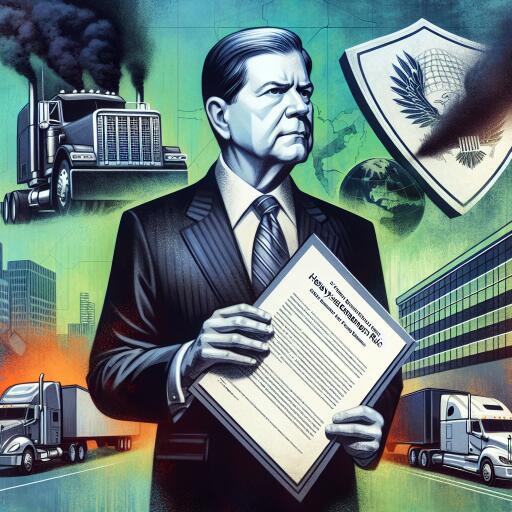
Virginia Challenges Federal Emissions Rules: A Debate Over Environmental Impact and Legal Authority
In an escalating fight against federal environmental regulations, Virginia Attorney General Jason Miyares has initiated legal challenges against several environmental rules proposed by the Biden administration. These challenges focus on regulations that span a variety of sectors, from transportation emissions standards to power plant emissions and waste management in the meat and poultry industry. The heart of Miyares’ legal argument is the assertion that these federal mandates represent overreach, infringing on states’ rights and responsibilities.
Among these regulations, those pertaining to emissions from heavy trucks and passenger vehicles have sparked significant debate. Virginia, which aligns its passenger vehicle emissions standards with California due to historical smog problems, finds itself at a crossroads with the new federal directives aimed at nationwide standardization. This includes proposals that could redefine how power grids operate, impact supply chains, and alter consumer behavior across the United States.
The Biden administration has introduced these rules as part of a broader environmental agenda, which benefits from unprecedented funding for renewable energy projects and infrastructure improvements under the Inflation Reduction Act and the Bipartisan Infrastructure Law. However, these measures have elicited mixed reactions among various stakeholders in Virginia, including environmental groups, the trucking industry, and electric utilities.
Environmental advocates have voiced disappointment in the legal pushback, emphasizing the pressing need to address transportation sector emissions, the largest source of greenhouse gases in the U.S. These emissions notably contribute to climate change, exacerbating wildfires, flooding, and other environmental catastrophes. Advocates argue that adopting stricter emission standards for heavy trucks is essential for mitigating these effects.
Conversely, the Virginia Trucking Association and others in the industry describe the new regulations as impractical, pointing to the financial burdens they impose and the logistical challenges related to charging infrastructure. This perspective highlights the broader complexities of transitioning to a more sustainable transportation model, particularly in industries heavily reliant on traditional fuel sources.
Manufacturers like Volvo, with operations in Virginia, express alignment with the EPA’s goals but stress the necessity of a realistic path toward zero-emission vehicles (ZEVs), underlining the critical role of accessible charging infrastructure to encourage consumer adoption of electric trucks.
Similarly contentious discussions surround the EPA’s proposed rule changes for power plants, intended to significantly reduce reliance on fossil-fuel-generated electricity. These rules would mandate existing and future coal and natural gas plants to adopt carbon capture technologies or cease operations, a move that has stirred debate among utilities, particularly given the nascent stage of carbon capture technology.
Despite the controversy, some industry representatives acknowledge the environmental necessity of regulating greenhouse gas emissions, though they seek judicial review to ensure compliance measures are realistic and technologically attainable.
Virginia’s journey towards a cleaner energy future has been marked by significant legislative efforts, including the Virginia Clean Economy Act, which charts a course for an electric grid less dependent on fossil fuels. Yet, as the debate unfolds in courtrooms and public forums, the path to achieving these environmental goals remains fraught with technological, economic, and legal challenges.
The lawsuit brought forth by Attorney General Miyares raises critical questions about the balance between federal authority and state autonomy in environmental regulation. It also underscores the complexity of transitioning to sustainable practices in sectors foundational to the U.S. economy. As these legal challenges proceed, the outcomes will likely have far-reaching implications for environmental policy, state-federal relations, and the broader fight against climate change in the United States.
In conclusion, Virginia’s legal challenge against federal emissions rules highlights a pivotal moment in the ongoing debate over environmental policy and governance. As stakeholders from various sectors weigh in, the dialogue continues to unfold, reflecting the diverse perspectives and interests at play. The resolution of these challenges will not only shape Virginia’s environmental landscape but also set precedents for how the nation navigates the intersection of legal authority, state rights, and the urgent need for environmental stewardship in the face of climate change.





Leave a Reply